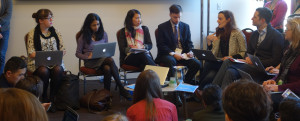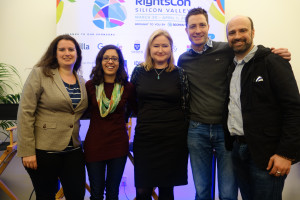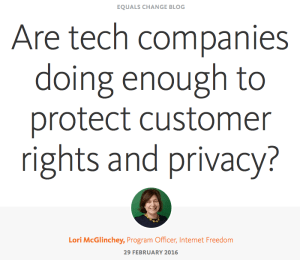Posted at 13:20h
in
Events,
News
by Priya Kumar
Issues of transparency, encryption, and corporate accountability played a central role at last week’s RightsCon conference in San Francisco, and RDR’s Index and data helped inform many discussions at the annual technology and human rights conference. Participants in various panels and workshops highlighted the value of RDR’s Index. Three public sessions organized by RDR, including a standing room-only session focused on terms of service enforcement, demonstrated how research-based advocacy can push companies to better respect users’ rights and help to inform policy solutions.
 In a panel about data breaches, security expert Bruce Schneier called RDR’s Index “very valuable,” since the prospect of performing poorly on a public ranking can make companies think twice about the cost of collecting too much user information. In a session on institutionalizing human rights commitments at companies, Nicole Karlebach and Katie Shay from Yahoo’s Business and Human Rights Program described how engaging with civil society and research organizations, including RDR, gives them useful perspectives to share with other staff at Yahoo. At a session on remedy, Yves Nissim from the French telecom Orange said the company is using the RDR Index and methodology as a guide in its efforts to disclose more information about its practices. In addition, representatives from companies not included in the Index said they used RDR’s methodology to evaluate their own policies.
In a panel about data breaches, security expert Bruce Schneier called RDR’s Index “very valuable,” since the prospect of performing poorly on a public ranking can make companies think twice about the cost of collecting too much user information. In a session on institutionalizing human rights commitments at companies, Nicole Karlebach and Katie Shay from Yahoo’s Business and Human Rights Program described how engaging with civil society and research organizations, including RDR, gives them useful perspectives to share with other staff at Yahoo. At a session on remedy, Yves Nissim from the French telecom Orange said the company is using the RDR Index and methodology as a guide in its efforts to disclose more information about its practices. In addition, representatives from companies not included in the Index said they used RDR’s methodology to evaluate their own policies.
Many discussions at RightsCon highlighted the need for more transparency about company practices that relate to freedom of expression and privacy. For example, while some companies publish rules or community standards that explain what content is and is not permitted on their service, users are left in the dark about how companies enforce those rules.

Panelists discuss terms of service enforcement at a public session organized by RDR.
Panelists at RDR’s session on terms of service enforcement explained that this lack of clarity means that users can be locked out of their accounts for reasons they don’t understand. Such uncertainty can erode user trust in companies, they added. A few company representatives at the session shared the difficulties they face in reporting such information, which include providing enough context so the public understands what the data means. This mix of participants provided meaningful dialogue on a concern where disclosure is sorely lacking.
Several projects in addition to RDR’s Index are pushing for greater respect for users’ rights. At RightsCon, researchers from the Center for Technology and Society at FGV-Rio de Janeiro discussed their draft findings on how the terms of service of 50 online platforms comply with the human rights of freedom of expression, privacy, and due process. In addition, OnlineCensorship.org released its first report, which found that users whose content is removed may not understand why and that users are either unaware or unsatisfied with appeal mechanisms.
While corporate transparency regarding terms of enforcement is nearly non-existent, reporting on government requests for user information has emerged as a standard practice. The Transparency Reporting Toolkit, a project by the Open Technology Institute and Berkman Center, also launched at RightsCon. It identified best practices and aims to develop a platform that companies can use to standardize their reports, enabling greater comparison and more in-depth analysis of the reports.
Throughout the conference, RDR connected with members of these projects as well as others from civil society, academia, companies, and the investor community. We organized a private session to discuss possible revisions to the Index methodology. Participants described how the Index has informed their work and provided feedback about how the indicators relate to the human rights concerns that users face when using such products and services. This feedback helps ensure that RDR’s Index remains a relevant measure to push for greater respect for users’ rights.
At a session on incorporating software and device companies in the Index, technologists and other experts brainstormed how to frame indicators on such topics as encryption and the privacy practices of apps in app stores. The conversation helped highlight the types of public disclosure RDR can evaluate for software and device companies.
While RDR plans to expand the types of companies its Index covers, one project alone can’t cover the full global universe of companies in this sector. RDR has encouraged other civil society and research organizations to use the methodology to conduct national or regional versions of the Index. To promote such projects, we teamed up with EFF on a session to share lessons learned about ranking companies in different parts of the world.
Participants discussed the importance of considering local culture when conducting such research efforts. For example, in regions where where companies are not used to engaging with civil society or academic researchers about digital rights issues, researchers can provide examples of other companies in other countries and regions that have changed in response to public pressure. This can underscore the positive intentions of such research.

The RDR team at RightsCon
RDR team members also participated in several other panels and workshops at the event. Rebecca MacKinnon spoke at sessions about cybersecurity and human rights and multi-stakeholder processes. Allon Bar spoke about global perspectives on privacy as well as universal principles for the internet. Priya Kumar discussed data breaches, terms of service and human rights, and freedom of assembly online. Ciprian Iancu presented on digital literacy and digital security training.
Priya’s comments on data breaches and privacy were quoted in a Consumer Reports blog post. Allon’s comments on internet openness were included in a UNESCO article. The Committee to Protect Journalists also highlighted RDR’s involvement with RightsCon in a blog post.
Overall, RightsCon was an exciting opportunity to connect with stakeholders, share our insights, and learn from others. We look forward to reconvening at RightsCon 2017 in Brussels!
 Access Now, a long-time RDR partner, launches its outreach efforts today, in the form of a campaign of public letters addressed to companies that RDR ranked. The letters offer specific recommendations to help companies improve their practices affecting users’ rights and freedoms, addressing issues such as data protection, content restriction, digital security, and remedy. The recommendations are based directly on the 2015 Corporate Accountability Index findings.
Access Now, a long-time RDR partner, launches its outreach efforts today, in the form of a campaign of public letters addressed to companies that RDR ranked. The letters offer specific recommendations to help companies improve their practices affecting users’ rights and freedoms, addressing issues such as data protection, content restriction, digital security, and remedy. The recommendations are based directly on the 2015 Corporate Accountability Index findings.
 In a panel about
In a panel about 


